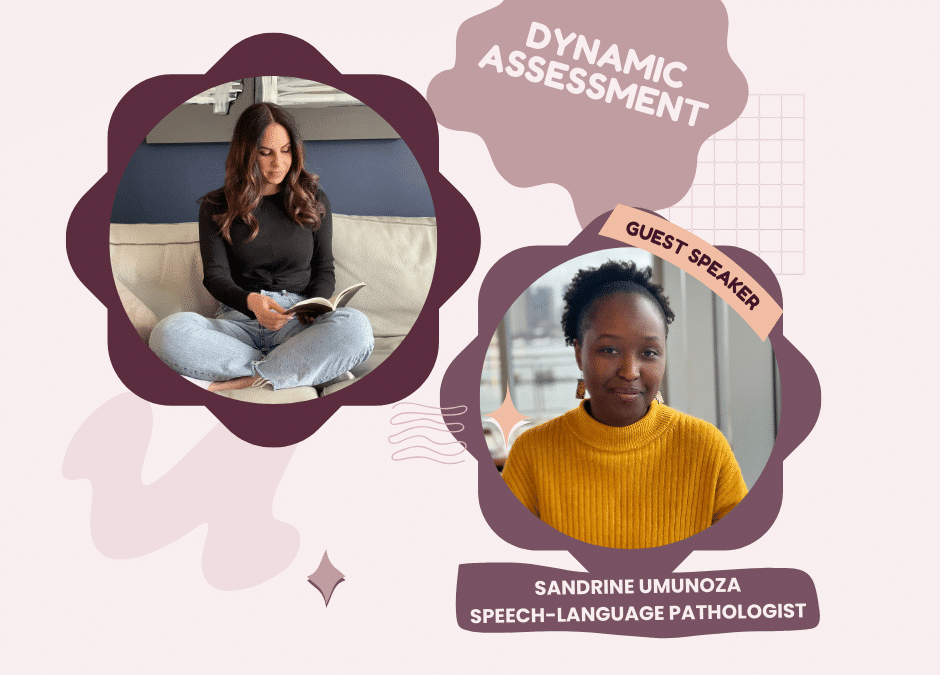Dynamic Assessment in Speech Therapy: Approaches for Multilingual Families
Working with multilingual and multicultural families presents a unique challenge for speech therapists. Melissa Farkouh and Sandrine Umunoza share their experiences and discuss the importance of dynamic assessment in evaluating and intervening with children.
You can watch this interview in English here.
Building Relationships and Understanding Cultural Contexts
Melissa and Sandrine stress the importance of building strong relationships and understanding the cultural contexts of families. This approach is crucial for successful intervention with multilingual and multicultural children.
Dynamic Assessment Practices
Dynamic assessment offers a more holistic and individualized approach compared to traditional evaluation methods. This method helps differentiate linguistic differences from language disorders.
Cultural Sensitivity and Competence
Understanding the child’s cultural context is essential for accurate diagnosis and effective intervention. Culturally responsive evaluation involves using familiar and engaging materials and methods.
Interactive Assessment Techniques and Practical Examples
Sandrine uses interactive techniques like play and storytelling to assess children. These techniques are more reflective of the child’s natural abilities.
Examples of Techniques for Preschool-Aged Children
- Educational Games: Sandrine plays with the child using age-appropriate educational games to evaluate their language skills in a natural way.
- Sentence Building: She uses cards with words or pictures, and the child must assemble them to create sentences.
- Modeling and Repetition: Sandrine models sentences and observes how the child reacts and learns. She provides extra cues and repeats sentences to help the child understand.
Examples of Techniques for School-Aged Children
- Role-Playing Games: Sandrine engages children in role-playing games and real-life scenarios to evaluate their understanding and use of language.
- Sentence Analysis: She uses blocks or cards to represent parts of a sentence and helps the child organize them correctly.
- Reading and Writing Assessments: Sandrine incorporates reading and writing tests to analyze reading fluency, correct use of morphemes, and narrative structure.
Specific Approach for Dyslexia and Learning Disabilities
Sandrine develops specific strategies for older children, especially those with learning disabilities such as dyslexia.
Details of the Approach with School-Aged Children
- Observation and Repetition: Sandrine observes how the child responds to different types of support. For example, she uses visual aids or mnemonic devices to reinforce learning.
- Static Tasks: At the end of the intervention, Sandrine introduces static tasks to validate progress. For instance, she includes reading fluency assessments or rapid naming tasks.
- Comprehensive Evaluation: Sandrine identifies missing components of the child’s language skills and assesses them statically to ensure complete care.
- Mix of Static and Dynamic: For school-aged children, Sandrine prefers a combination of dynamic and static assessments to obtain an accurate picture of the child’s language skills.
Potential Use of Artificial Intelligence
Speech therapists can utilize artificial intelligence (AI) to analyze language samples and generate reports. For instance, tools like Natalie AI can transcribe audio recordings into text and analyze language samples to detect pronouns, verb inflections, and other linguistic features. This reduces the administrative workload and allows more focus on intervention.
Conclusion and Invitation to Training
Dynamic assessment in speech therapy offers a deeper understanding of children’s abilities, allowing interventions to be tailored to their individual needs. By following Sandrine Umunoza’s tips and examples, you can better evaluate and intervene with multilingual and multicultural children.
Join Me for Dynamic Assessment Training
Would you like to learn more about dynamic assessment in speech therapy? Sign up now to participate in our dedicated training. Together we will explore these innovative techniques and how they can transform your practice.



